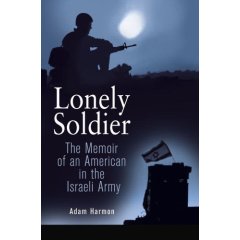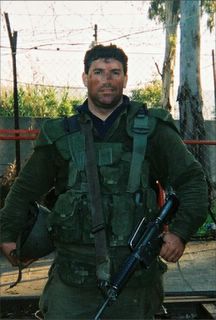Monday, July 17, 2006
Jerusalem Post reviews "Lonely Soldier":
A Few Good Men, by Ralph Amelan.
On my occasional tours of reserve duty, I would gaze from my guard post at the night sky, brushing up on my astronomy and making sure a meteorite did not fall on our platoon. It's a thankless job, but someone has to do it. Yet it is not the stuff that publishable military memoirs are made of.
Chapter headings such as "Potatoes I have Peeled," "Boots I have Polished" (now there's a short chapter), "Things My Commanding Officers Have Called Me" (a somewhat longer chapter, sadly); well, they do not set a reader's pulse racing.
Ideally, you need to tell tales of struggle and achievement, of hardships overcome, of enemies fought and defeated, of character formed. And Adam Harmon, in Lonely Soldier (the too-literal translation of chayal boded) seems well placed to tell such a tale.
He was bitten by the Zionist bug as a teen. After completing his undergraduate studies in America, he left his family and moved to a kibbutz, joining the army only five months later at the end of 1990. After trying out for various elite units, he ended up in the paratroops, and most of the book is the story of his service there over the following 18 months, including undergoing punishing training and subsequent reserve duty.
He saw some action, ambushing terrorists and successfully capturing one as well. But Harmon's theme is simple: how an ordinary Jewish-American college kid rose to the physical and mental challenge of front-line service in the Israeli army and acquitted himself with honor.
He is entitled to be proud. The book, written in the present tense, is engagingly frank about his unequal battle with the Hebrew language and his doubts about making a success of his service. He captures well in simple language the day-to-day grind of training, and any IDF veteran is bound to be reminded of aspects of his time in the army, including things he would prefer to forget. If Harmon's drive to prove himself and to live up to the highest professional standards occasionally feels obsessive, it should be remembered that this is a real part of the military world.
Read the full article.
A Few Good Men, by Ralph Amelan.
On my occasional tours of reserve duty, I would gaze from my guard post at the night sky, brushing up on my astronomy and making sure a meteorite did not fall on our platoon. It's a thankless job, but someone has to do it. Yet it is not the stuff that publishable military memoirs are made of.
Chapter headings such as "Potatoes I have Peeled," "Boots I have Polished" (now there's a short chapter), "Things My Commanding Officers Have Called Me" (a somewhat longer chapter, sadly); well, they do not set a reader's pulse racing.
Ideally, you need to tell tales of struggle and achievement, of hardships overcome, of enemies fought and defeated, of character formed. And Adam Harmon, in Lonely Soldier (the too-literal translation of chayal boded) seems well placed to tell such a tale.
He was bitten by the Zionist bug as a teen. After completing his undergraduate studies in America, he left his family and moved to a kibbutz, joining the army only five months later at the end of 1990. After trying out for various elite units, he ended up in the paratroops, and most of the book is the story of his service there over the following 18 months, including undergoing punishing training and subsequent reserve duty.
He saw some action, ambushing terrorists and successfully capturing one as well. But Harmon's theme is simple: how an ordinary Jewish-American college kid rose to the physical and mental challenge of front-line service in the Israeli army and acquitted himself with honor.
He is entitled to be proud. The book, written in the present tense, is engagingly frank about his unequal battle with the Hebrew language and his doubts about making a success of his service. He captures well in simple language the day-to-day grind of training, and any IDF veteran is bound to be reminded of aspects of his time in the army, including things he would prefer to forget. If Harmon's drive to prove himself and to live up to the highest professional standards occasionally feels obsessive, it should be remembered that this is a real part of the military world.
Read the full article.
Booklist review:
"This well-told tale of an American Jew in the Israeli army adds notably to our knowledge of the Israeli Defense Forces (IDF) during the 1990s. Harmon traveled to Israel during his college years and decided on a permanent move after graduation. He was fit enough to be accepted for the elite parachute and recon units, donning an IDF uniform for the first Gulf War and the second intifada. Thereby he adopted the perspective of being early on the scene when terrorism struck the local shopping mall, riots arose outside a favorite nightclub, and a pitched battle was only a commute away. He provides many vivid portraits of fellow soldiers in the world's most reticent army but not much on weapons and tactics, for which the IDF is no doubt grateful. His attitude is that of an observant Jew and a strong Zionist, and with passion and clarity he enlightens us about a crucially significant fighting force not covered with this kind of intimacy by the general media."
-Roland Green
Copyright © American Library Association. All rights reserved
"This well-told tale of an American Jew in the Israeli army adds notably to our knowledge of the Israeli Defense Forces (IDF) during the 1990s. Harmon traveled to Israel during his college years and decided on a permanent move after graduation. He was fit enough to be accepted for the elite parachute and recon units, donning an IDF uniform for the first Gulf War and the second intifada. Thereby he adopted the perspective of being early on the scene when terrorism struck the local shopping mall, riots arose outside a favorite nightclub, and a pitched battle was only a commute away. He provides many vivid portraits of fellow soldiers in the world's most reticent army but not much on weapons and tactics, for which the IDF is no doubt grateful. His attitude is that of an observant Jew and a strong Zionist, and with passion and clarity he enlightens us about a crucially significant fighting force not covered with this kind of intimacy by the general media."
-Roland Green
Copyright © American Library Association. All rights reserved
Bing West offers advance Praise:
“This book transcends place and nationality to reveal the essence of soldierly virtues–tough, decent, honest, and accepting of continuous hardships and solitary duties at low pay. As a soldier, Harmon would wince at such praise. But it’s true. This is the story of what makes a real soldier.”
–Bing West, author of "No True Glory: A Frontline Account of the Battle for Fallujah"
Bing West's website, check it out.
No True Glory: A Frontline Account of the Battle for Fallujah
The March Up: Taking Baghdad with the United States Marines
“This book transcends place and nationality to reveal the essence of soldierly virtues–tough, decent, honest, and accepting of continuous hardships and solitary duties at low pay. As a soldier, Harmon would wince at such praise. But it’s true. This is the story of what makes a real soldier.”
–Bing West, author of "No True Glory: A Frontline Account of the Battle for Fallujah"
Bing West's website, check it out.
No True Glory: A Frontline Account of the Battle for Fallujah
The March Up: Taking Baghdad with the United States Marines

My first book, "Lonely Soldier: The Memoir of an American in the Israeli Army", is now available on Amazon

